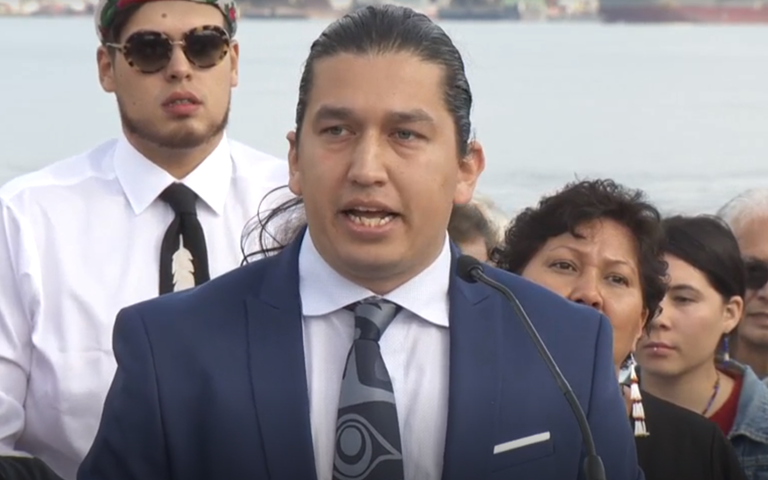Khelsilem, a Squamish Nation councilor and spokesperson, at a Vancouver press conference on Aug. 30. Screencap courtesy of CPAC
First Nations and environmental groups who were part of the largest judicial review case against the Trans Mountain pipeline expansion cheered the Federal Court of Appeal’s decision to dismiss the project’s approval.
“I was anticipating an unhappy decision today, but I'm quite happy that I was wrong and that the courts have upheld our arguments that we made throughout this whole thing,” Khelsilem, a Squamish Nation councilor and spokesperson, said in a phone interview, “which was that the Canadian government did not behave honorably in their dealings with us.”
Khelsilem said the decision sends a message that “it’s really up to the government to fix their broken system.
“Things can be different, and it’s up to the government to make different choices.”
The case was a consolidation of several separate requests for judicial review from six First Nations, environmental groups, and the cities of Vancouver and Burnaby. Justice Eleanor Dawson ruled in her decision that the National Energy Board had made a “critical error” in not considering project-related tanker traffic in its report, and that the federal government had failed to engage in adequate consultation with First Nations groups.
Coldwater Indian Band Chief Lee Spahan said it was “a great day” at a Vancouver press conference held by all six First Nations groups involved in the case. “I can’t stop smiling, it feels so good.”
The Coldwater Indian Band argued that the National Energy Board had failed to consider an alternative route for the pipeline that would not have passed so close to its aquifer, which is the sole source of drinking water for 90 per cent of the reserve.
“[The government] can say they consulted, but they never ever got our consent,” Spahan said.
Related: Morneau says buying Trans Mountain was “right decision” after federal court voids project approval
Grand Chief Stewart Phillip, president of Union of BC Indian Chiefs, said he was was shocked by the court’s verdict. “I was anticipating coming here and talking about the need to carry on the battle and I was really taken aback by the decision,” he said. “I’m absolutely elated, I’m ecstatic.”
On Twitter, Vancouver Mayor Gregor Robertson called the decision a “monumental win for the rights of Indigenous peoples and all of us who stand with them in firm opposition to a project that would massively increase climate pollution and put our coast at huge risk of oil spills.”
Canadian Association of Petroleum Producers CEO Tim McMillan, however, said the verdict is emblematic of an unclear regulatory system.
“The federal government now owns [the pipeline].They own it because the proponents saw substantial lack of clarity or certainty in the regulatory process,” McMillan said in an interview. “So yes, it will get built, but it speaks to a broader concern in Canada that private sector companies [are] increasingly stepping away from these major projects.”
McMillan points to the Enbridge Northern Gateway pipeline, which was similarly killed two years ago, and TransCanada’s Energy East pipeline as projects that couldn’t move forward through the regulatory system.
“So we have a challenge that our regulatory system does not have the clarity it should, it's not as simple as it could be, and it's losing investment for Canada,” McMillan said.



